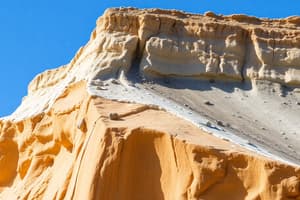Podcast
Questions and Answers
What is weathering?
What is weathering?
The process of breakdown of rocks at the Earth's surface by the action of water, ice, acids, salts, plants, animals, gravity, and changing temperatures.
Which of the following is NOT a type of weathering?
Which of the following is NOT a type of weathering?
- Chemical Weathering
- Geological Weathering (correct)
- Biological Weathering
- Physical Weathering
What causes physical weathering?
What causes physical weathering?
Caused by the effects of changing temperatures on rocks, leading to their breakdown.
Chemical weathering is caused by temperature changes.
Chemical weathering is caused by temperature changes.
What is carbonation?
What is carbonation?
How does biological weathering occur?
How does biological weathering occur?
_____ is an example of physical weathering where water freezes and expands in cracks.
_____ is an example of physical weathering where water freezes and expands in cracks.
Match the types of weathering with their descriptions:
Match the types of weathering with their descriptions:
Flashcards are hidden until you start studying
Study Notes
Weathering
- Weathering is the process that breaks down rocks at the Earth's surface.
- It's caused by factors like water, ice, acids, salts, plants, animals, gravity, and changing temperatures.
Types of Weathering
-
Physical (Mechanical) Weathering: This type of weathering involves the breakdown of rocks by physical forces.
- Abrasion: Rocks are worn down by friction from water, wind, or ice carrying sediment.
- Freeze-Thaw: Water seeps into cracks, freezes, expands, and breaks the rock apart.
- Exfoliation: Cracks form parallel to the surface due to pressure reduction during uplift and erosion.
-
Chemical Weathering: This involves the breakdown of rocks by chemical reactions.
- Carbonation: Carbon dioxide in rainwater forms carbonic acid, which dissolves limestone.
- Acidification: Polluting gases like sulfur dioxide and nitrogen oxide form stronger acids in rainwater, leading to acid rain.
- Hydrolysis: Water reacts chemically with rocks, breaking down chemical bonds.
- Hydration: Water reacts with rocks, changing their chemical structure.
- Oxidation: Oxygen and water react with rocks, often creating a rusty-colored surface.
-
Biological Weathering: This occurs when organisms contribute to rock breakdown.
- Plant Roots: Growing roots create cracks in rocks.
- Burrowing Animals: Animals like moles and earthworms create holes and move rock fragments to the surface.
- Chemical Compounds: Some organisms produce acids that react with rocks.
Studying That Suits You
Use AI to generate personalized quizzes and flashcards to suit your learning preferences.




